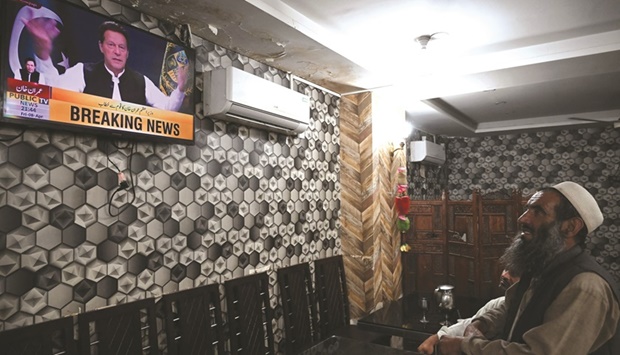• PM alleges ‘conspiracy’ but accepts court ruling on confidence vote
Prime Minister Imran Khan said yesterday that he would not recognise an opposition government if it succeeded in an attempt to oust him, the latest twist in a political crisis engulfing the nuclear-armed nation.
The country’s parliament will convene today to vote on Khan as prime minister, an official notice said yesterday, potentially cutting short his term as leader.
The country’s top court ruled late on Thursday that Khan must face the no-confidence vote, which he is widely expected to lose, meaning he would be ousted from office.
A session of the lower house of parliament has been called for 10.30am today, the speaker’s office said.
The vote, brought by the opposition leader Shehbaz Sharif, is the fourth point on the agenda.
The Supreme Court ruling said that Khan acted illegally by dissolving parliament and calling fresh elections after the deputy speaker of the national assembly – a loyalist – refused to allow an earlier no-confidence vote because of “foreign interference”.
In a 40-minute address to the nation touching on familiar themes, Khan railed against the Pakistan Muslim League – Nawaz (PLM-N) and the Pakistan Peoples Party (PPP), two normally feuding dynastic groups who joined forces to oust Khan and his upstart Pakistan Tehreek-e-Insaf party (PTI).
With his majority gone, Khan accused the opposition of buying support in the assembly with “open horse-trading ... selling of lawmakers like goats and sheep”.
The prime minister said they had conspired with Washington to bring the no-confidence vote because of his opposition to US foreign policy – particularly in Muslim nations such as Iraq and Afghanistan.
“I was disappointed with the Supreme Court decision but I want to make it clear that I respect the Supreme Court and Pakistan’s judiciary,” Khan said.
However, he added that the court should also have examined the reason for the first vote being rejected.
“There is a conspiracy from abroad,” the 69-year-old Khan said. “This is a very serious allegation ... that a foreign country conspired to topple an entire government.”
Washington has denied any involvement.
Yesterday constitutionalists praised the Supreme Court verdict, calling it an end to the so-called “doctrine of necessity” that has seen courts throughout Pakistan’s history rule against clear illegality, but accept the consequences as being good for the country.
PML-N leader Sharif, brother of three-time prime minister Nawaz Sharif and likely to replace Khan, said the decision “has saved Pakistan and the constitution”.
“Democracy is the best revenge,” tweeted PPP leader Bilawal Zardari Bhutto, the scion of another political dynasty.
His parents are assassinated former prime minister Benazir Bhutto and ex-president Asif Ali Zardari.
A former cricket star who took office in 2018, Khan said he would not recognise any opposition government that replaced him.
“I will not accept an imported government,” he said, calling for peaceful protests tomorrow. “I’m ready for a struggle.”
The crisis has threatened political and economic stability in the country of 220mn people, where the military has ruled for half its history.
If he loses the no-confidence vote, the opposition will put forward a candidate for prime minister.
Sharif, the younger brother of three-time former prime minister Nawaz Sharif, said after the court ruling that the opposition had nominated him to take over should Khan be ousted.
“The court decision will end political uncertainty and constitutional crisis to a large extent. This will help restore some confidence in the markets,” Mohamed Sohail of Karachi-based Topline Securities told Reuters. “However economic challenges remain and it will be interesting to see how a new set-up takes bold steps to put things in order.”
The opposition has said it wants early elections but only after delivering Khan a political defeat and passing legislation that it says is needed to ensure the next polls are free and fair.
The election commission has said the earliest it can hold elections is in October, which means any new government will have to deal with pressing economic issues before that.
Political analyst Hasan Askari told AFP that any new government will still have to deal with the underlying issues.
“Conflict and confrontation will persist ... the prospects of political harmony and long-term stability are minimal,” he said.
Pakistan has been wracked by political crises for much of its 75-year existence, and no prime minister has ever seen out a full term.
Publicly the military appears to be keeping out of the current fray, but there have been four coups since independence in 1947 and the country has spent more than three decades under army rule.

A man listens to Prime Minister Khan addressing the nation on television at a restaurant in Islamabad.
